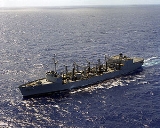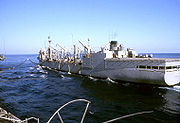
Wichita class replenishment oiler
Encyclopedia

Ship class
A ship class is a group of ships of a similar design. This is distinct from a ship-type, which might reflect a similarity of tonnage or intended use. For example, the is a nuclear aircraft carrier of the Nimitz class....
of seven replenishment oiler
Replenishment Oiler
A replenishment oiler or fleet tanker is a naval auxiliary ship with fuel tanks and dry cargo holds, which can replenish other ships while underway in the high seas. Such ships are used by several countries around the world....
s used by the United States Navy
United States Navy
The United States Navy is the naval warfare service branch of the United States Armed Forces and one of the seven uniformed services of the United States. The U.S. Navy is the largest in the world; its battle fleet tonnage is greater than that of the next 13 largest navies combined. The U.S...
from the late 1960s to the mid-1990s. During this time the ships were commissioned
Ship commissioning
Ship commissioning is the act or ceremony of placing a ship in active service, and may be regarded as a particular application of the general concepts and practices of project commissioning. The term is most commonly applied to the placing of a warship in active duty with its country's military...
naval auxiliaries with the hull classification
Hull classification symbol
The United States Navy, United States Coast Guard, and United States National Oceanic and Atmospheric Administration use hull classification symbols to identify their ship types and each individual ship within each type...
AOR. The ships were designed for rapid underway replenishment
Underway replenishment
Underway replenishment or replenishment at sea is a method of transferring fuel, munitions, and stores from one ship to another while under way.-History:...
using both connected replenishment and vertical replenishment. The ships could carry 160,000 barrels of petroleum fuel, 600 tons of munitions, 200 tons of dry stores and 100 tons of refrigerated stores.
With the reduction in the U.S. Navy fleet, these ships were all decommissioned and stricken from the Naval Vessel Register
Naval Vessel Register
The Naval Vessel Register is the official inventory of ships and service craft in custody of or titled by the United States Navy. It contains information on ships and service craft that make up the official inventory of the Navy from the time a vessel is authorized through its life cycle and...
(NVR) in the 1990s.
One earlier ship of the AOR type, but not of this class, was the USS Conecuh (AOR-110), in service with the U.S. Navy 1946–56.
Ships
| Ship | Hull No. | Builder | Home Port | Commissioned– Decommissioned | NVR page |
|---|---|---|---|---|---|
| Wichita USS Wichita (AOR-1) USS Wichita was the lead ship of the s. She was the second ship to be named for the city of Wichita, Kansas.The second Wichita was laid down on 16 June 1966 at Quincy, Massachusetts, by the General Dynamics Quincy Shipbuilding Division; launched on 16 March 1968; sponsored by Mrs. Howard B.... |
AOR-1 | General Dynamics, Quincy | Oakland Naval Supply Depot, Oakland Naval Supply Depot, Oakland was a supply facility operated by the U.S. Navy in Oakland, California. During World War II, it was a major source of supplies and war materials for ships operating in the Pacific.... |
1969–1993 | AOR-1 |
| Milwaukee USS Milwaukee (AOR-2) |... |
AOR-2 | General Dynamics, Quincy | Norfolk Naval Station Norfolk Naval Station Norfolk, in Norfolk, Virginia, is a base of the United States Navy, supporting naval forces in the United States Fleet Forces Command, those operating in the Atlantic Ocean, Mediterranean Sea, and Indian Ocean... |
1969–1994 | AOR-2 |
| Kansas City USS Kansas City (AOR-3) |... |
AOR-3 | General Dynamics, Quincy | Oakland | 1970–1994 | AOR-3 |
| Savannah | AOR-4 | General Dynamics, Quincy | Norfolk | 1970–1995 | AOR-4 |
| Wabash USS Wabash (AOR-5) USS Wabash was a in the United States Navy from 1970 to 1994.The Wabash was named for the Wabash River, a river that rises in Darke County, Ohio, near Fort Recovery and meanders westward across Indiana until it reaches Illinois at a point just southwest of Terre Haute.USS Wabash was laid down on... |
AOR-5 | General Dynamics, Quincy | Long Beach Long Beach Naval Shipyard thumb|right|300px|Long Beach Naval Shipyard in 1993The Long Beach Naval Shipyard, which closed in 1997, was located at Terminal Island between the city of Long Beach and the San Pedro district of Los Angeles and approximately 23 miles south of the Los Angeles International Airport.The Long Beach... |
1971–1994 | AOR-5 |
| Kalamazoo | AOR-6 | General Dynamics, Quincy | Norfolk | 1973–1996 | AOR-6 |
| Roanoke USS Roanoke (AOR-7) |... |
AOR-7 | National Steel National Steel and Shipbuilding Company National Steel and Shipbuilding Company, commonly referred to as NASSCO, is a shipyard in San Diego, California and Norfolk, Virginia and a division of General Dynamics. The shipyard specializes in constructing commercial cargo ships and auxiliary vessels for the US Navy and Military Sealift... |
Long Beach | 1976–1995 | AOR-7 |

